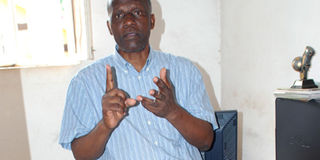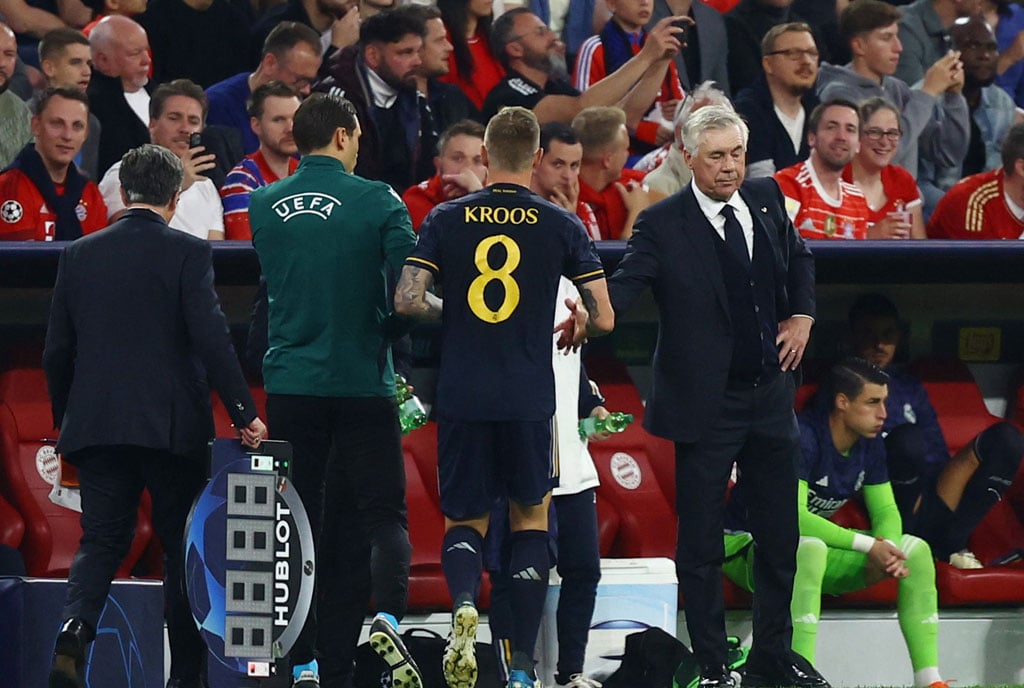Kirunda; a unique character in a classy lot

Kirunda stresses a point during the interview. PHOTO: ISMAIL KEZAALA
What you need to know:
Jimmy Kirunda won several accolades in his illustrious career that saw him don the national team jersey for 15 years.
Kampala
One yellow card in a 20-year career, 32 goals as a stand-in striker in one season and a penalty phobia, everything about Jimmy Kirunda is unique and somewhat extraordinary.
Like Ugandans might have come to learn, not so often does a country get blessed with astonishing talent that thrives for over decade. 1974, 1976 and 1978 in particular, are years many Ugandan soccer fans hold so dear to their hearts. A prolific goal scorer in Phillip Omondi (RIP), surrounded by an elegant crop of players, Uganda Cranes shook the powerhouses in African football. And for all this time, one man was the pivot in Uganda’s wheel: Kirunda.
Indisputably one of the best African footballers of his generation, Kirunda achieved what most current youngsters can only dream about.
He captained the national team to three Africa Nations Cup tournaments but reaching the final in 1978 remains Kirunda’s proudest and most memorable moment.
“I can’t explain how we did it because everyone thought we were the underdogs,” Kirunda recalls. “The team worked so hard and even after losing to Ghana we were content because reaching the final was a bonus.”
That Cranes campaign in Accra included a 3-1 commanding victory over Congo Brazzaville, a 1-3 loss to Tunisia and a 3-0 stellar performance against Morocco that earned the physically-gifted Kirunda and his troops a slot in the semi-finals.
Although not easy fodder, Nigeria were Uganda’s prey at the penultimate stage, going down 2-1. Buoyed by the home crowd, Ghana outmuscled the Cranes 2-0 in the final but that would be Uganda’s best ever performance and last appearance at the continental showpiece to date. Recent efforts to qualify for the tournament have ended in sour heartbreak for players and fans alike.
Omondi top scored in Ghana with four goals but being the skipper and outstanding defender, Kirunda had a fair share of plaudits. “What helped us most in Ghana was the fact that at least six of us had competed in the past two tournaments. We had the experience, and to me that’s the best team Uganda has ever had,” Kirunda, who also played part in the 1972 and 73 Africa Cup futile qualification attempts, recounts. For any central defender, hard tackles are unavoidable but Kirunda’s disciplinary record on the pitch is as smart as it is fascinating. “I got into the referee’s book only once throughout my career,” Kirunda says with a grin. And that yellow card wasn’t a caution for a bad tackle. “I handled the ball during the game against Morocco at the 78 Nations Cup.
Many great players are known for terrible penalty misses, the Ugandan legend avoided such situations. “I was good at dead balls and would score free kicks but I feared penalties. Actually, I never attempted a spot kick in my career,” he reveals, leaving you wondering how he managed to score 32 goals in the 1978 league season while at KCC. He played as a striker that season.
“Like any other kid, I played as a forward while growing up. I later converted into a defender and was always hesitant whenever I was asked to play up front.”
That is typical of Kirunda; everything he did and still does is distinctive. Very energetic and calm as they come, Kirunda is a qualified coach having attained his first certificate in 1973 but won’t run around hunting for jobs like most of his peers.
“I tried coaching but realised there is too much stress involved. I don’t like it especially at clubs where coaches are abused and pelted with stones by rowdy fans.”
Instead, he opted to venture into the media ‘to try and promote local sport that has been dogged by the English Premiership’. He is the current CEO of UgaSport magazine.
“I realised there was a vacuum. With the Premiership taking over, I decided to start a magazine to try and bring back fans to local football and other sports.”
For a man that started playing soccer in 1963 in Mulago, a Kampala suburb, Kirunda knows the nitty-gritty of the Ugandan game. “I was born and bred in Mulago. A few months after I had started practicing, I got picked to play for the hospital team in the Kampala District League.” “I was just 13 or 14 at the time. A few months later, I was called to play for Ngeye clan in the Bika By’baganda tournament.”
Player of theYear
In 1967, he joined Kampala Bus Service (KDS) but shortly left for Express where he spent one season and crossed to KCC three years later. Until 1981, Kirunda stayed with KCC, winning the league (three times), Kakungulu and the East and Central Club Championships titles. He signed for SC Villa in 1982, top scoring for the club with 13 goals and inspired them to the Super League title. The performance earned him the Player of the Year award.
When he finally retired in 1983, he took to coaching and helped Buikwe Stars gain Super League status a year later. His other coaching jobs were at Uganda Cooperative Union (1987-88), Bell (1994) and Natete in 1995.
But even after attaining a Grade B license in 1987, attending a high level coaching course in 1993, World Cup training clinic in 2002 and acquiring an FA certificate handed to him by the legendary Bobby Charlton, Kirunda thinks he belongs somewhere else. Just like coaching, he doesn’t fancy managing a team. He was Cranes team manager between 1989 and 1996, winning the Cecafa Challenge Cup during his first year in charge.
At the time, the likes of Majid Musisi and Paul Hasule (both RIP), were the shinning stars for Cranes. “It was a decent team. But as a team manager you feel more pressure than the players.” Many suggest that the dearth of youth structures lingers as the biggest problem for Uganda’s football and Kirunda reckons as much. “During our time we would be forced to play soccer in school, that’s how most kids picked interest. Schools are the ultimate bases for youth structures. Today, things have changed; some schools have no facilities and taking children to the few academies is a very expensive venture.”
But, if a few things are put right, he feels Uganda can qualify for the 2012 Nations Cup. “Qualifying is not as easy as some people think,” he reasons, “It’s a difficult task that requires utter government support and a strong financial stand. This eternal politicking must also end.” Kirunda was last year appointed a personal assistant to Fufa president Lawrence Mulindwa, returning to football after a very long hiatus. “Politics was keeping me away but I am now happy to be back. I am a member of the technical committee and can contribute positively to the growth of the game.”
Kirunda will tonight receive the utl-Uspa legendary award, becoming the second retired sportsman after Leo Rwabwogo to be given special recognition.
Legendary award long overdue
Jimmy Kirunda won several accolades in his illustrious career that saw him don the national team jersey for 15 years.
He came close to lifting the Africa Cup of Nations in 1978 as Cranes captain but settled for second after losing 2-0 to hosts Ghana. That was a painful moment but good enough to make him the first ever Ugandan to captain Uganda to an AFCON final. Tonight, the 60-year-old icon, will be honoured with the utl-Uspa legendary award. Only boxer Leo Rwabwogo, has received this award before while many other sporting legends have passed on without any special recognition. “When I was told that I would be given that award, I felt so happy,” Kirunda told Saturday Monitor on Thursday. “
The idea to reward legends was started by the Uganda Sports Press Association (Uspa) but Kirunda feels many sportsmen have passed on without recognition. It is good to recognise people when they are still alive,” he said. “The system of rewarding sportsmen should have started a long time ago.”
KIRUNDA THROUGH THE YEARS
1963: Joins Mulago Hospital
1965: Joins KDS
1967: Crosses to Lint Marketing Board
1968: Called to national junior team
1969: Make senior debut for Cranes
1970: Joins KCC
1973: Attends first coaching course
1974: Captains Cranes to AFCON
1976: Win league title with KCC
1976: Captains Cranes to AFCON
1978: Skippers Cranes to AFCON finals
1978: Wins East and Central Club C’ship
1980: Signs for United Arab Emirates FC
1982: Wins Super League title with Villa
1983: Retires
1984: Joins Buikwe Stars as coach
1987-88: UCCU coach
1989: Appointed Cranes team manager
1994: Starts coaching Bell FC
1993: Attends high level Caf coaching course
1995: Natete FC
2002: Attends World Cup coaches training clinic
2002: Attains FA certificate for strategic planning
2009: Appointed Fufa president personal assistant




